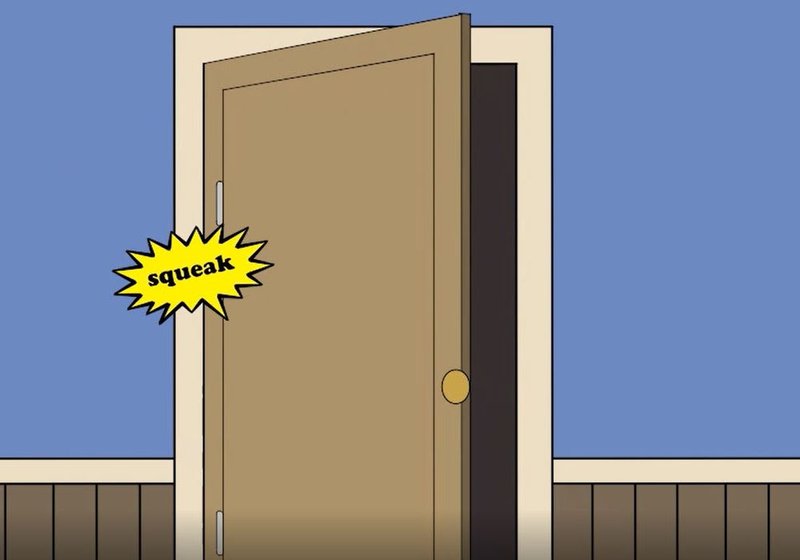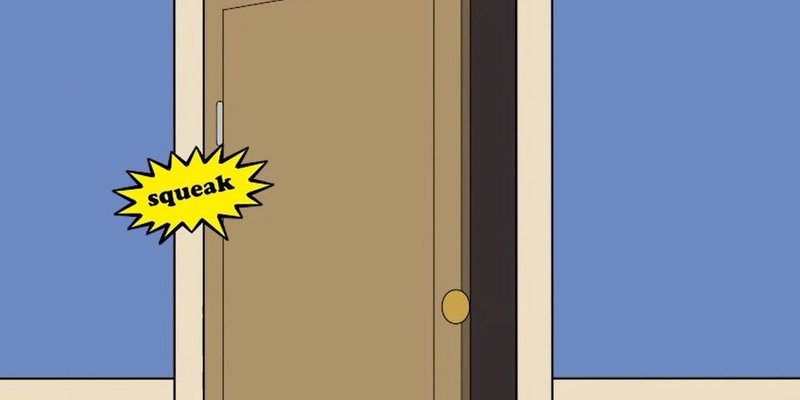
Think of your door like a musical instrument. Just like a guitar string can become loose, your door’s components can wear out over time, leading to those irritating creaks. Let’s explore the reasons behind the creaking sound and what you can do about it. With a little understanding, you might find that tackling this problem is easier than you think.
What Causes a Door to Creak?
Doors can creak for various reasons, often due to friction between moving parts. One of the most common culprits is the hinges. When the hinges become dirty or lack lubrication, they can make annoying noises as the door moves. Think about it: when two surfaces rub against each other without proper oil, they create sound.
Another reason could be the wood itself. Wood can expand or contract with changes in temperature or humidity, affecting how the door fits in the frame. When wood swells, it can rub against the door frame, causing that characteristic creak.
Lastly, the weight of the door plays a role too. Heavier doors might have more strain on their hinges, making them more prone to creaking, especially when opened or closed slowly. You might be wondering if a creaky door means it’s about to fall off. Not necessarily! But it is a sign to pay attention before it leads to bigger issues.
Understanding Your Door’s Hinges
Doors are typically held up by two or three hinges, depending on their size. Each hinge has a pin that allows it to pivot smoothly. If the hinges are rusty or dirty, this can cause friction, leading to that irritating creaking sound.
To check your hinges, carefully open and close the door. Listen closely for any noise coming from the hinge area. If you hear a squeak or creak, the hinge likely needs some attention.
Here’s a simple way to fix it: grab a can of lubricant—WD-40 works well. Spray a small amount directly onto the hinge, and then move the door back and forth to work the lubricant in. You’ll be amazed at how quickly the sound vanishes. Just like that, your door’s “voice” is back to normal.
The Role of Weather Changes
Have you noticed your door creaking more during certain seasons? Temperature and humidity changes can significantly impact wood, causing it to expand and contract. In warmer, humid weather, wooden doors might swell, pressing against the frame and creating friction. Conversely, during colder months, wood can shrink, which may seem like a relief at first, but it can result in gaps that can also create odd noises.
Here’s an analogy: think about a sponge. When it’s wet, it expands, and when it dries, it shrinks. Your door behaves similarly. If you live in an area with frequent weather changes, it’s worth checking your door’s fit and adjusting it as needed.
If your door is creaking more in summer, consider installing a dehumidifier to keep the air drier, or try using a wood conditioner to help the door maintain its shape.
Inspecting for Damage
Sometimes, a creaky door can indicate underlying damage. Take a moment to inspect the door and its frame. Look for any cracks, warps, or uneven areas. If the door is misaligned, it can rub against the frame, creating that dreaded creak.
To check for misalignment, close the door slowly and observe how it interacts with the frame. If you notice it catching or rubbing at any point, you might need to make adjustments. Most doors can be *realigned* by adjusting the hinge screws or shimming the hinges to lift the door slightly.
If you do find significant damage, don’t panic! Consulting a professional can help you determine if a repair, rather than a replacement, is the best option.
Do I Need to Replace My Door?
If you’ve done all the right things—cleaned the hinges, lubricated them, and checked for damage—but your door still creaks, it might be time to consider a replacement. While not always necessary, an older door can deteriorate over time and may not function properly like it used to.
When thinking about replacement, consider the material. Solid wood doors tend to be more durable, while hollow core doors can be more prone to damage and creaking.
You might want to explore different styles or materials that suit your home better—after all, a door is not just a functional item; it’s an important part of your decor. If you do replace the door, make sure to install it properly to avoid future creaking.
Regular Maintenance Tips
Preventing future creaks is much easier than you might think. Here are some simple maintenance tips:
- Lubricate hinges regularly: A quick spray every few months can keep things running smoothly.
- Check the alignment: If your door starts to stick, it might mean it’s time for an adjustment.
- Inspect for damage: Regularly glance over the door and frame for any signs of wear and tear.
- Control the environment: Use a dehumidifier if you live in a humid area.
By staying proactive, you can keep your door from creaking and maintain its functionality for years to come.
Creaking doors can be a nuisance, but understanding why they make those noises can help demystify the situation. Whether it’s dirty hinges, environmental changes, or underlying damage, most solutions are straightforward. With a little maintenance and care, you can keep your door quiet and functional.
So next time you hear that familiar groan, don’t worry—it’s just your door reminding you it needs a little love and attention. Give those hinges a spray, check for damage, and you’ll be back to smooth openings in no time!
